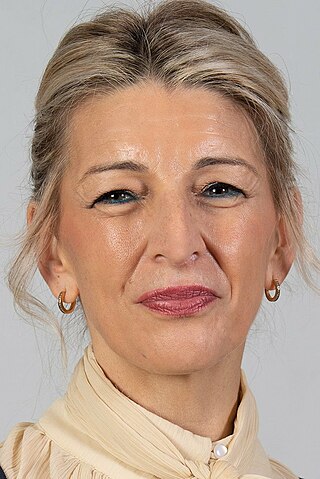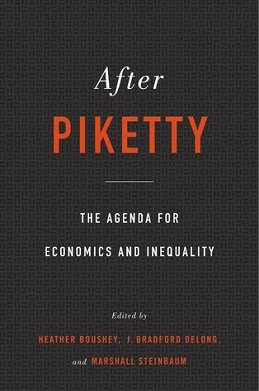Universal inheritance or basic inheritance is a proposal for all citizens, upon reaching a certain age, to receive an economic endowment from the State. [1] [2]
From heterodox economic perspectives, inheritance has been criticized both from a historical standpoint, as property and inequality in its distribution couldn't be understood without the original accumulation of capital; and from an ethical and justice standpoint, as no human being would have the right to greater ownership over Earth's wealth solely by the circumstance of being born into one family or another. [3] [4]
In this manner, universal inheritance has been proposed as a way to offset wealth distribution inequality, funded through progressive taxes. [5] [6]
The first proposal for universal inheritance was made by Thomas Paine in 1795, [7] although similar measures have been proposed in different countries and historical moments since then. [5] [8]
Among the criticisms of this measure is the fact that it's proposed as an inheritance for all citizens, regardless of their economic status. [9] Additionally, it could lead to a reduction in the effort of young individuals to educate themselves and contribute through their work to the well-being of the entire society. [10]

Citizen's dividend is a proposed policy based upon the Georgist principle that the natural world is the common property of all people. It is proposed that all citizens receive regular payments (dividends) from revenue raised by leasing or taxing the monopoly of valuable land and other natural resources.
Guaranteed minimum income (GMI), also called minimum income, is a social-welfare system that guarantees all citizens or families an income sufficient to live on, provided that certain eligibility conditions are met, typically: citizenship and that the person in question does not already earn a minimum level of income to live on.

Albert Rivera Díaz is a Spanish former politician who was the leader of Citizens from its founding in 2006 until 2019. He was a member of the Parliament of Catalonia (2006–2015) and the Congress of Deputies (2015–2019).
Union, Progress and Democracy was a Spanish political party founded in September 2007 and dissolved in December 2020. It was a social-liberal party that rejected any form of nationalism, especially the separatist Basque and Catalan movements. The party was deeply pro-European and wanted the European Union to adopt a federal system without overlap between the European, national and regional governments. It also wanted to replace the State of Autonomies with a much more centralist, albeit still politically decentralized, unitary system as well as substituting a more proportional election law for the current one.

The inequality of wealth has substantially increased in the United States in recent decades. Wealth commonly includes the values of any homes, automobiles, personal valuables, businesses, savings, and investments, as well as any associated debts.
Redistribution of income and wealth is the transfer of income and wealth from some individuals to others through a social mechanism such as taxation, welfare, public services, land reform, monetary policies, confiscation, divorce or tort law. The term typically refers to redistribution on an economy-wide basis rather than between selected individuals.

Thomas Piketty is a French economist who is a professor of economics at the School for Advanced Studies in the Social Sciences, associate chair at the Paris School of Economics and Centennial Professor of Economics in the International Inequalities Institute at the London School of Economics.
The social dividend is the return on the natural resources and capital assets owned by society in a socialist economy. The concept notably appears as a key characteristic of market socialism, where it takes the form of a dividend payment to each citizen derived from the property income generated by publicly owned enterprises, representing the individual's share of the capital and natural resources owned by society.

Universal basic income (UBI) is a social welfare proposal in which all citizens of a given population regularly receive a minimum income in the form of an unconditional transfer payment, i.e., without a means test or need to work. In contrast a guaranteed minimum income is paid only to those who don't already receive an income that is enough to live on. A UBI would be received independently of any other income. If the level is sufficient to meet a person's basic needs, it is sometimes called a full basic income; if it is less than that amount, it may be called a partial basic income. No country has yet introduced either, although there have been numerous pilot projects and the idea is discussed in many countries. Some have labelled UBI as utopian due to its historical origin.
Tax policy and economic inequality in the United States discusses how tax policy affects the distribution of income and wealth in the United States. Income inequality can be measured before- and after-tax; this article focuses on the after-tax aspects. Income tax rates applied to various income levels and tax expenditures primarily drive how market results are redistributed to impact the after-tax inequality. After-tax inequality has risen in the United States markedly since 1980, following a more egalitarian period following World War II.

Vicente Navarro is a Spanish sociologist and political scientist. He has been a Professor of Health and Public Policy at Johns Hopkins University, US, for over 30 years. He is also emeritus professor in political and social science at the Pompeu Fabra University in Barcelona, Spain, and is the director of the JHU-UPF Public Policy Center in Barcelona, which is jointly sponsored by the two institutions. He is also the director of the Observatorio Social de España, where he coordinates a research project on the welfare state.
Podemos is a left-wing populist political party in Spain. Part of the anti-austerity movement in Spain, it was founded in January 2014 by political scientist Pablo Iglesias Turrión and other academics in the aftermath of the 15-M Movement protests against inequality and corruption.

Capital in the Twenty-First Century is a book written by French economist Thomas Piketty. It focuses on wealth and income inequality in Europe and the United States since the 18th century. It was first published in French in August 2013; an English translation by Arthur Goldhammer followed in April 2014.

Isabel Natividad Díaz Ayuso is a Spanish politician and journalist serving as the president of the Community of Madrid since 2019. She is the president of the People's Party of the Community of Madrid.
A wage subsidy is a payment to workers by the state, made either directly or through their employers. Its purposes are to redistribute income and to obviate the welfare trap attributed to other forms of relief, thereby reducing unemployment. It is most naturally implemented as a modification to the income tax system.

Capital and Ideology is a 2019 book by French economist Thomas Piketty. Capital and Ideology follows Piketty's 2013 book Capital in the Twenty-First Century, which focused on wealth and income inequality in Europe and the United States.

The 2023 Spanish general election was held on Sunday, 23 July 2023, to elect the 15th Cortes Generales of the Kingdom of Spain. All 350 seats in the Congress of Deputies were up for election, as well as 208 of 265 seats in the Senate.

Yolanda Díaz Pérez is a Spanish politician and labour lawyer, currently serving as Second Deputy Prime Minister since 2021, and Minister of Labour and Social Economy of the Government of Spain since 2020. A member of the Congress of Deputies since 2016, she has previously been a Ferrol municipal councillor (2003–2012) and member of the Parliament of Galicia (2012–2016). She was the National Coordinator of Esquerda Unida (EU) from 2005 to 2017. In 2023, she founded the electoral platform Sumar, which currently leads.

After Piketty: The Agenda for Economics and Inequality is a 2017 collection of essays edited by the economists Heather Boushey, J. Bradford DeLong, and Marshall Steinbaum. The essays center on how to integrate inequality into economic thinking. Common themes are Thomas Piketty’s influence on academia and policy, the need for better wealth data, inequality in the United States, and the reasons for the process of wealth accumulation and rising inequality discussed by Piketty in his book Capital in the Twenty-First Century (2013). In the final entry, Piketty himself responds to the essays.

Volt Spain is a political party in Spain. It is part of the pan-European party and movement Volt Europa, which advocates for closer European and cross-border cooperation and is characterised by its supranational character. As part of Volt, it has a Member of the European Parliament, Damian Boeselager, who represents the party there.